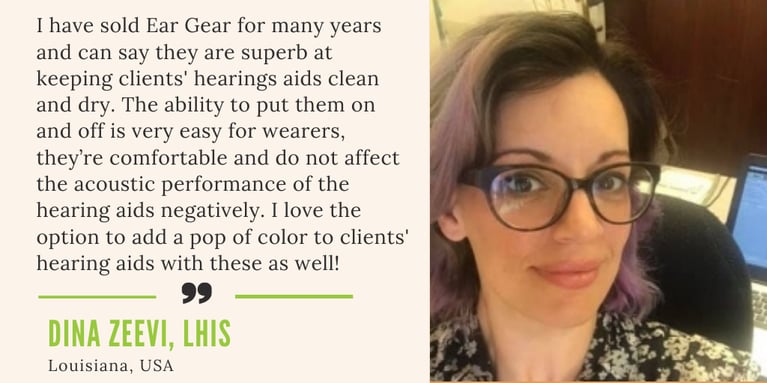Every audiologist has their own reason for opening up their practices Perhaps one person wants to offer clients a more personalized experience than big-box retailers can, while another audiologist aims to help Spanish-speaking families. Whatever your motives, building a strong and successful audiology practice comes down to having a solid plan in place, marketing strategically, developing trust with clients and providing excellent service.
1. Write a business plan

Do you have a formal business plan? If not, it’s time to write one. Ditto if you have a plan, but you haven't looked at it in years. By creating such a document, you'll be able to clearly identify your competitors and what they do well.
Hopefully, it will also help you identify if there is a gap in service, or any opportunities that for you to set your practice apart from the rest.
This process also gives you a chance to hone in on who you serve, and how you need to market or advertise to them.
You should also outline all the products and services you will offer as well as your marketing strategies for each one. The plan helps answer the question, “Why would someone want to come to my practice as opposed to another?” Do you offer better after-market support than your competitors, or are you competing on price?
It's best to revisit this plan once a year, because even the best plans can (and should!) change over time. You should think of this as a living document, easy to update as finances, technology, trends and goals change.
For instance, suppose you have not updated your plan since 2010. The marketing section might be woefully out of date and not include such strategies as having a blog to drive inbound marketing or collecting and displaying online reviews.
Even a business plan that has not been looked at in just a couple of years might not account for the huge rise in digital growth. Your website must now be optimized for mobile traffic, as more and more people begin their search online.
2. Promote Digital Outreach
Speaking of digital growth, many successful audiology practices these days have great digital outreach. More than that, they know what interests their target clients. As an example, suppose your practice knows that at least 20 percent of your clients exercise regularly. They spend a lot of time outdoors biking, running, climbing, hiking, swimming and so on. These activities are not exactly friendly to hearing aids and cochlear implants, but proper planning helps maximize enjoyment.
Part of your outreach strategy could be a series of blog posts that could help your customers have more fun and less worry while enjoying these activities. For example, Ear Gear helps with chafing, moisture and wind noise, and even helps prevent devices from being lost. A good way to engage with your audience might be writing an article that showcases similar equipment that can help with exercising.
Digital outreach also includes giving clients multiple communication options, especially important for an audiology practice. Many clients may prefer and expect to book appointments online, or even start conversations through Facebook, text, or Instagram rather than through traditional channels like the phone. Make sure you're giving them that opportunity.
3. Build Trust with Clients
There are many ways to build trust with clients, and quite a few overlap with other areas such as digital outreach. For instance, when you have a blog that provides smart, fun and educational information, people will not only find your content when they're searching for it, but it will instantly give you credibility because you're providing value from the start.
The same concept applies for existing clients who follow the blog - how if you communicate with them regularly and provide tips, news, or updates that they find valuable then they'll stay with you.
That said, getting to know your individual clients is critical in building trust. You must understand their needs, their pain points, even their hobbies, and you have to ask the right questions.
For instance, the needs of a senior golfer are going to be different than that of a small child (which is again, different than the parent of that child).
By asking your customers the right questions, you can help solve issues often before they arise. This may involve directing them to the right resources, giving them tools and skills to reduce those issues, or advising them on accessories that can assist them.
For example, a product like Ear Gear can be suggested to the mother of a toddler, and you can explain how the corded product keeps their hearing instrument from falling and getting lost if the child removes them.
In the same theme, a golfer may get really irritated by the constant wind noise when they play. An accessory like Ear Gear reduces the noise while providing more comfort. By getting to know each customer as an individual, you foster loyalty and return visits.
Another thing to acknowledge is that some of your clients might sign; one complaint that many people in the Deaf community have is non-signing audiologists. Taking a class or two could help you develop basic proficiency that goes a long way toward building trust with a certain segment of your client base.
On the other hand, perhaps none of your clients sign, but many speak Spanish, so Spanish classes could be a better avenue. The point is, clients will recognize your effort and appreciate it. By seeing you care, they are more inclined to trust you.
4. Provide Top-Notch Client Service
Depending on where your practice is (or will be), Costco and other large retailers may be among your strongest competitors. It is possible they are more affordable at first glance, but you can—and should—provide client service that brings you out ahead.
In fact, your service will likely end up saving folks money in the long run since they are more likely to get it right the first time with advice and products tailored to their unique needs.
In any case, strive for an optimal office environment, pleasant and knowledgeable staff, good “bedside” manner, and consistent communication that includes updating clients and keeping them in the loop.
In your business plan, define your expectations for the waiting room decor, for each patient examination room and so on. These small details can be REALLY important.
Patients are also drawn to offices that offer accessories—it’s makes the experience a one-stop shop, but also allows an audiologist to recommend and provide solutions at the same time. Batteries, phones or a product like Ear Gear, which is designed to increase comfort and prevent many issues associated with hearing instruments, are all things that let a customer know you’re taking your business (and their happiness) seriously.
5. Drive Client Referrals
Client referrals are the number-one driver of new business for many audiology practices, so it's important to assess the ways in which you can increase the number of referrals you get.
Many methods are organic; for example, providing quality products and excellent service makes it more likely that clients will enjoy working with you and refer you to people who need an audiologist.
Digital outreach helps here, too. It is well-documented that the Internet has changed how people shop for products and services; even after getting referrals and recommendations, prospective clients will go online to investigate your audiology practice. Ensure that what they find is fair, engaging and professional, and you should be in a good position to get these new appointments.
Testimonials such as those on your website are one way that client referrals happen. Ask for testimonials for your practice and give your customers the opportunity to discuss their customer service experience, how easy it was to book an appointment, your office and staff, and anything else.
Related Reading: How Ear Gear can help you increase your word of mouth referrals
There is no time like now to build or improve your audiology practice. It all goes back to a solid business plan, smart marketing and creative networking.





